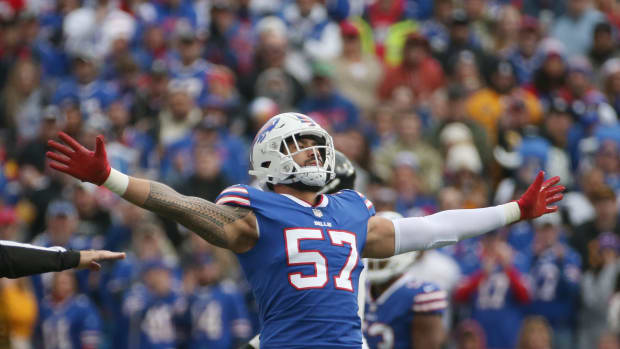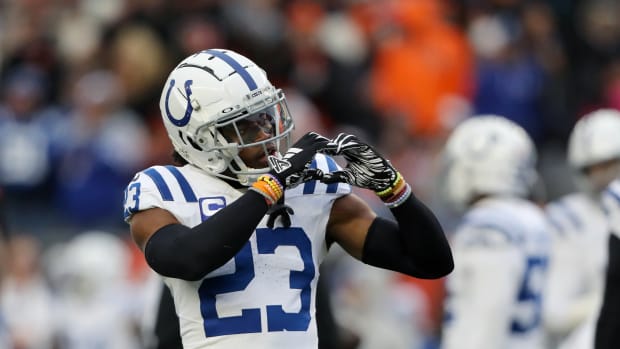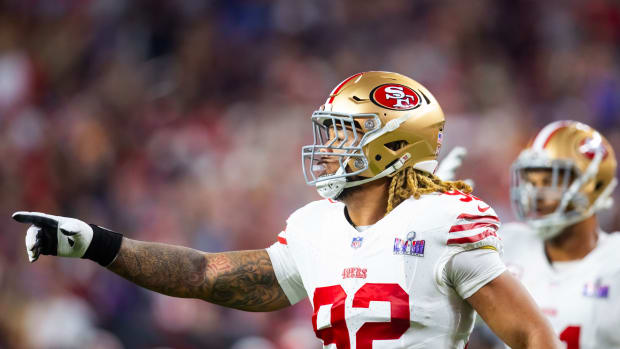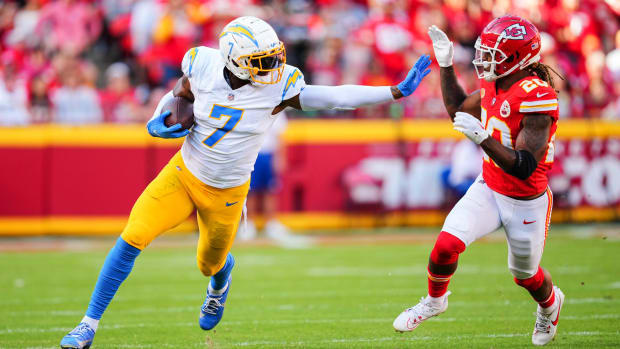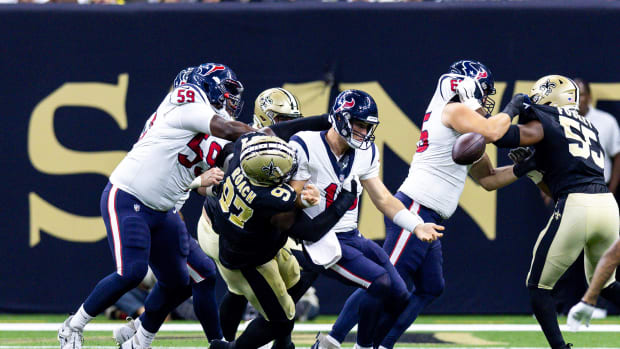
Should RG3 Be QB2?
By Peter King
I think Washington coach Jay Gruden made a mistake benching Robert Griffin III in favor of Colt McCoy.
I say that with the full understanding that Griffin is awful right now. “He has the yips,” says Chris Cooley, the analyst on the team’s radio broadcasts. For a quarterback, few things are worse than being a professional short-armer who is afraid, and unable, to zing a ball to an exact spot.
But the crux of my argument is a simple one: Since his starry rookie year, Griffin has rushed back from serious knee surgery and played a total of 18 games, and thrown 575 passes, over two seasons. He has struggled, and that is putting it kindly. But are 18 games and 575 passes enough proof that Washington needs to dump him for another quarterback? I don’t think so. If I were Gruden, I’d want to fight through the last five weeks of this lousy season with Griffin, because I’d want to be able to sit down with general manager Bruce Allen and owner Daniel Snyder in January and have a more complete picture of the QB. Isn’t that the best way to decide whether Griffin should enter 2015 as the starter, a contender for the starting job, or if he should be jettisoned elsewhere?
Eighteen games. Is that enough? That’s how many games Griffin has played since winning the NFL Offensive Rookie of the Year award 22 months ago. Even if my game plans would be hamstrung by Griffin’s inability to digest the complete playbook right now, I’d still want to see him play, even if he’s capable of only doing 30-40% of what Gruden would ideally like to call.
I believe the team’s thinking right now is this: If Griffin approaches the offseason humbled and willing to work hard—and harder in the classroom than he has to at this point—Gruden and Allen and Snyder would like to give him another shot to be their guy in 2015. They’d like to see if Griffin can morph into the pocket passer the organization has been trying to mold him into. That’s my view. I think it’s entirely possible that Jay Gruden is trying to save Robert Griffin III’s career, and he feels the best way to do that is to hide him over the next month. It’s a scary thought, and I understand the logic there. But this team needs more evidence to make an informed decision about its quarterback, the most important position in the game. You can’t see that evidence if Griffin is on the bench.
* * *
By Andy Benoit
By benching Robert Griffin III, Jay Gruden seems to be telling us that he has doubts about his quarterback’s leadership, preparation and ability to immediately improve his shortcomings. Why else would the coach of a 3-8 team bench a highly drafted 24-year-old in order to go with Colt McCoy, a 28-year-old who, if he plays well, could become Washington’s long-term backup? A part of Gruden must know that if he were to keep RG3 in the lineup, others in the locker room would feel the coach cares more about appearances than winning. Because clearly, right now, Griffin doesn’t give Washington its best chance to win.
The problems start with Griffin’s fundamentals, or lack thereof. His footwork is sloppy and erratic. His throwing mechanics can be as well. That’s why, too often, his dropback isn’t synced with the timing of the receivers’ routes, which all but guarantees a bad outcome.
It’s clear that Griffin isn’t reading the field well, either. Based on my film study, it’s debatable whether he truly has a good sense for the entirety of a play’s design, let alone how it relates to what the defense is doing. As it stands, unless the play design works perfectly—a rare thing—Griffin cannot prosper. As I highlighted last week, there have been several instances when the play design has worked perfectly, but Griffin didn’t know where to go with the ball.
Griffin was actually benched by Mike Shanahan last year for these issues. The benching was under the guise of protecting Griffin from taking a pounding, but he was only taking a pounding because his flaws led to unnecessary hits—especially in the pocket. If Griffin were more polished, he would have had a chance to overcome and at least survive any shaky offensive line play, and Shanahan would have kept him in the lineup.
Griffin purportedly did not get along with Shanahan, which is too bad because Shanahan, unlike Gruden, was willing to cater to Griffin’s mobility. Under Shanahan, Washington had a zone running system that was perfect for play-action, read-option, moving pockets and other pistol concepts. We’ve seen very little of this under Gruden, who runs a more traditional pocket-oriented passing game. While it may seem ill-conceived to have Griffin run this sort of system, Gruden understands that, in the big picture, no NFL team will sustain long-term success if its quarterback can’t execute in the pocket.
It’s also possible that Gruden realizes what so many are failing to see: Griffin does not run well these days. If you just put on the film and watched Griffin without knowing who he was, you’d never think of him as a dynamically mobile quarterback. He’s slow and stiff compared to his rookie season. This has compromised his ability to escape pressure, which is why his limitations have become so apparent. It’s a major problem for Griffin but, thanks to Gruden, it will no longer be a major problem for Washington.
Follow The MMQB on Facebook, Twitter and Instagram.
[widget widget_name="SI Newsletter Widget”]

































